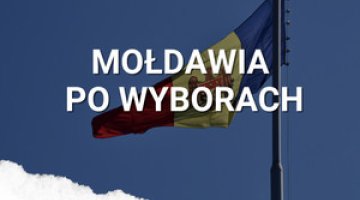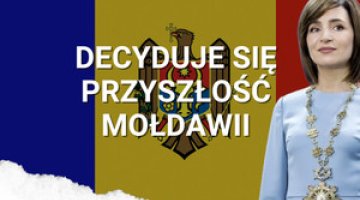Moldova: moderate success for the pro-European parties
The pro-European forces beat the pro-Russian parties by a small margin in the parliamentary election on 30 November in Moldova. According to data based on the calculation of almost 99% of the ballots, the Liberal-Democratic Party (PLDM), the core of the government coalition which had governed the country since 2009 and which is led by the former prime minister Vlad Filat received 20% of the votes, while the Democratic Party (PDM) controlled by Vlad Plahotniuc, one of Moldova’s richest people, won 15.9% of the votes. It may be expected that the two parties and the pro-European Liberal Party (PL), which garnered 9.5% of the vote, will form a new government coalition whose key priority will remain Moldova’s European integration. The coalition will probably have 55 of the 101 seats in parliament. However, the degree of support for the pro-European forces is lower in comparison to the previous election, in which they won a combined 59 seats.
The pro-Russian forces, which have undergone an unexpected reshuffle, will remain in opposition. The Socialist Party led by Igor Dodon became the strongest grouping in parliament. This party won 20.7% of the vote, owing to several factors: its pro-Russian rhetoric, support from Russia, and the fact that another pro-Russian grouping, Patria, had been removed from election lists just a few days ahead of the election. The Communists, who had been backed by 40% of the voters in the previous election, this time received only 17.7% of the vote. These two groupings will probably have a combined total of 46 seats.
No major incidents were observed during the election, and it was recognised by both the OSCE and observers from the CIS. The Russian Ministry of Foreign Affairs pointed to numerous irregularities. It emphasised that the final outcome of the election had been affected by the decision to eliminate Patria, one of the key opposition parties, from the election race a few days ahead of the election and the restricted possibilities Moldovan citizens living in Russia had to vote.
The course of the election
The Chisinau Court of Appeals granted the Central Election Commission’s motion to remove the pro-Russian party Patria from election lists four days before the election. This was due to evidence provided by the Moldovan General Police Inspectorate proving that the party had failed to disclose that it had received over half a million US dollars from foreign donors. It cannot be ruled out that the decision to remove Patria from the election lists was an effect of the government’s concern about the support levels for the pro-European parties in the election, considering the growing popularity of this opposition grouping.
Patria is a new pro-Russian party on the Moldovan political scene, and stands in opposition to the present government. It is led by Renato Usatii, a Moldovan entrepreneur doing business in Russia. This party has gained significant strength on the Moldovan political scene over the past few months and, according to available forecasts, was expecting a support level of over 10%. According to pre-election opinion polls, this party stood a real chance of forming a government in coalition with the Socialist Party and at least a section of the Communist Party. Both the head of the EU delegation in Moldova and representatives of Western embassies expressed concern in connection with the elimination of Patria from the election. In turn, the Russian Ministry of Foreign Affairs stated that this decision “raises serious doubts as to whether the parliamentary election in Moldova is democratic.”
Some unrest was seen during the vote at the Moldovan embassy in Moscow. According to various data, between 5,000 and 15,000 Moldovans wanting to cast their votes went to the embassy on the election day. They had to queue for a long time and the number of ballots was limited (a total of only 6,000 ballots were available at the two polling stations in Moscow); this led to protests among them. Since only five polling stations were opened in Russia, which is home to between 250,000 and 300,000 Moldovan expatriate workers, many voters could have been deprived of the possibility of taking part in the election. Meanwhile, over twenty polling stations operated in Italy, where less than 200,000 Moldovan citizens live, and a total of over 90 polling stations were made available to voters across the EU and in the USA.
Despite all this, the election was recognised as democratic both by OSCE observers, who saw no serious irregularities, and the CIS observer mission. The independent Moldovan organisations monitoring the election expressed no reservations concerning the election process.
Summary of the results
The three pro-European groupings won the parliamentary election, but their result is only a moderate success. After four years of ruling the country, the influential groups who want their country to become integrated with the EU received fewer seats than in the election in 2010 (they won 59 then). This happened despite achievements from the pro-European coalition such as lifting the visa requirement for Moldovan citizens travelling to the Schengen Area or the signing of the Association Agreement with the EU. Their result would have probably been even worse had Patria not been eliminated from the electoral race and had the Moldovan citizens living in Russia been given the opportunity to vote without hindrance.
The Socialist Party led by Igor Dodon achieved a great success in this election and unexpectedly became the strongest force in parliament (its support level in opinion polls had ranged between 7 and 8%). The Socialists’ good result is an effect of political, media and financial support from Russia, as well as its aggressive election campaign and the fact that Patria was removed from election lists. Even though Renato Usatii appealed to his supporters to cast an invalid vote for Patria, most of them clearly decided to back Igor Dodon’s party. Hence the relatively low number of invalid votes (around 3.5%).
The Communist Party (PCRM) sustained the worst defeat. In comparison to the election in 2010, it lost more than half of its electorate. Furthermore, this is the first time in sixteen years that the Communists have lost the position of the largest grouping in Moldova’s parliament. The Communist Party (and above all its leader, Vladimir Voronin) has lost Moscow’s political and financial support. This factor was in part condemned the Communists to their poor result this election. Other factors behind this were: the internal split within PCRM resulting from a conflict between Voronin and the radically pro-Russian wing of the party led by its former ideologist, Mark Tkachuk and the lack of a coherent campaign and clear electoral message. Their result was additionally weakened by the fact that the Reformist Communist Party (PCR) took part in the election. PCR was registered in June this year and won 5% of the votes (the election threshold being 6%). Most likely, the formation of this grouping was inspired by the parties from the government coalition intending to deprive PCRM of a share of the votes. The symbolism used by PCR and also its acronym are similar to those of PCRM, and this may have confused some voters.
Post-election forecasts
Even though the Communists and Patria are criticising the election, both parties have appealed to their supporters to remain calm. Thus the risk that dissatisfied voters will take to the streets is low at present. In turn, the new leading opposition force, the Socialist Party, is satisfied with its result and will be focusing on further weakening the position of its main rival, the Communists, in the coming months.
LDPM, DPM and PL are likely to form the new cabinet together, one proof of which are initial post-election declarations made by the leaders of these parties. Iurie Leanca will probably lead the government again. However, some problems may appear in the process of forming the coalition due to both the internal conflict between individual pro-European parties and their struggle for the distribution of influence. If the cabinet is to be formed successfully, this will to a great extent depend on the stance Mihai Ghimpu, the leader of the Liberal Party, takes. Ghimpu is aware of the fact that PLDM and PDM will not be able to form the government without his party. Therefore, he will make efforts to gain as much influence as possible in the future coalition. If his demands are impossible to meet, it cannot be ruled out that PLDM and PDM will consider the possibility of forming a government with the Communist Party. This scenario, although it is less likely, cannot entirely be ruled out at present. Whatever the final form the new government takes is, it is set to continue the process of European integration and reforms resulting from the Association Agreement, although the interests of individual political and business groups linked to the governing parties will still make the introduction of changes in such key sectors as the administration of justice and the financial sector more difficult.





